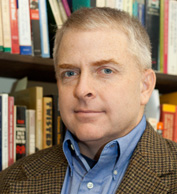FAITH + IDEAS =: last updated 03/14/2013
February 26, 2013 Volume 6, Issue 4
Faith + Ideas = an e-conversation with the faculty of Gordon College
By Thomas Albert (Tal) Howard
“How heavy the papal mantle weighs,” wrote Dante in his Divine Comedy. The shepherding of some 1.2 billion Catholics is no simple business, so one cannot begrudge the frail Pope Benedict for stepping down. Given the rarity of such an event, the media frenzy is understandable. Much commentary in the days ahead will focus on Benedict’s legacy and the next papal election. But given that traditionally only death separates a pope from office, the moment also calls for remembrance of those popes who finished their office under, well, grimmer circumstances.
The Apostle Peter, according to Catholics, was the first pope. Tradition claims he was crucified upside down in Rome because he felt unworthy to be crucified in the same manner as Christ. Peter was the first of fourteen popes who are known or believed to have been martyred between the first and seventh centuries, the last being Martin I in 655. In light of the expansion of Christianity during this time, the church father Tertullian’s famous line that the “blood of martyrs is the seed of the church” is not beside the point.
Things get shady from the ninth to the eleventh century. At this time, the papal office became an object of contention among wealthy, feuding Roman families. No less than one third of the popes from 872 and 1012 died under mysterious, often macabre circumstances. John VIII (872-82) was bludgeoned to death by members of his own entourage. Stephen VI (896-97) was strangled. Leo V (903) was deposed and likely murdered by order of his successor, Sergius (904-11). John X (914-28) died from suffocation. Because of popular distrust of Pope John XIV (983-84), the Antipope Boniface VII (974, 984-85) arrested him and placed him in the Rome’s Castel Sant’Angelo, where he died either from poison or starvation, depending on one’s sources. (“Antipope” is a term used by the Church to speak of papal claimants of questionable legitimacy.)
Incidentally, the first German Pope Gregory V (996-99) died under suspicious circumstances, likely poisoning.
So not all popes have enjoyed longevity in office. Many pontificates have been much shorter than Benedict’s eight years. In the history of the papacy, there have been numerous so-called “year of three popes,” when one pope died within a year of holding office, occasioning another election. Sometimes, it has been a matter of days; John Paul I, for instance, died after only thirty-three days in office in 1978—a death that still occasions conspiracy theories. And one year, 1276, was actually a year of four popes: Gregory X, Innocent V, Pope Adrian V, and John XXI, who died tragically in office in 1277 when his study collapsed on him.
Some of the longest reigning popes have met vexing ends. Pope Pius VI (1775-99), witnessed the desecrations of the French Revolution, including the burning of his effigy in Paris. When French forces captured Rome in 1798, he was kidnapped with the idea of hauling him back to Paris. In 1799, he died en route in Valence in a dilapidated hotel, purportedly praying for his enemies. When he had earlier pled to finish his days in Rome, the French general Berthier shot back: “One can die anywhere.”
The longest reigning pope Pius IX (1846-78) died a distraught “prisoner of the Vatican” after nationalists unified Italy by confiscating the last remnant of the Papal States in 1870, ending a millennium and half of papal temporal rule in Rome. During the funeral procession in 1878, Pius’ corpse had to endure the ignominy of some hoodlums who almost succeeded in throwing the casket into the Tiber.
As has been pointed out many times now, the last pope to resign from office prior to Benedict was Gregory XII, who stepped down in 1415 to end a feud within the church. Since then (and largely before then) the tie between a pope and his office has been one of “till death do us apart.”
Has Pope Benedict broken with tradition or allowed for a new one? Time will tell. But given the fate of some of his predecessors, the least one might do is hope that this aging pope might look forward to a retirement as restful as his death is peaceful.
Thomas Albert Howard is Professor of History and directs the Center for Faith and Inquiry at Gordon College in Wenham, Mass. He is working on a book, The Pope and the Professor: Pius IX, Ignaz von Döllinger and the Quandary of the Modern Age.
